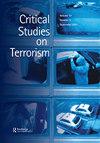Rethinking the Beirut bombing, rethinking terrorism: theorising counterviolence
IF 2.5
Q2 POLITICAL SCIENCE
引用次数: 0
Abstract
ABSTRACT After the January 6 attempted armed takeover of the Capitol, many commentators warned that describing the day as an act of domestic terrorism risked intensifying policing regimes targeting communities of colour. Others, however, encouraged the broadening of the domestic terrorism label to include armed white supremacists, given their violent efforts at regime change. Although these interventions have debated both the danger and utility in applying the terrorism label, few have challenged the concept of terrorism itself. Is terrorism a useful interpretive framework to understand the wide-ranging forms of political violence given that label, such as the September 11 attacks, the January 6 events, the Indigenous water protectors contesting the Dakota Access Pipeline, and the Black organisers classified as “Black Identity Extremists” for protesting police brutality? What are the material dangers of collapsing divergent political groups embedded in vastly different power relations under the terrorism label? Guided by these questions, this article examines the evolution of political vies for power between state and non-state actors to theorise counterviolence as a conceptual framework capable of interrogating the relationship between power, politics, and violence to better understand acts facilely reduced to “terrorism.”反思贝鲁特爆炸案,反思恐怖主义:反暴力理论化
在1月6日美国国会大厦发生未遂武装占领事件后,许多评论家警告称,将这一天描述为国内恐怖主义行为可能会加剧针对有色人种社区的警察制度。然而,另一些人则鼓励扩大国内恐怖主义的标签,将武装的白人至上主义者包括在内,因为他们以暴力手段推翻了政权。尽管这些干预措施对贴上恐怖主义标签的危险和效用都有争论,但很少有人对恐怖主义本身的概念提出质疑。恐怖主义是一个有用的解释框架,可以用来理解广泛形式的政治暴力,比如9 / 11袭击、1月6日的事件、争夺达科他输油管道的土著水保护者,以及因抗议警察暴行而被归类为“黑人身份极端分子”的黑人组织者?在恐怖主义的标签下,嵌入在截然不同的权力关系中的不同政治团体的崩溃会带来什么实质危险?在这些问题的指导下,本文考察了国家和非国家行为体之间政治权力争夺的演变,将反暴力理论化为一个概念框架,能够质疑权力、政治和暴力之间的关系,以更好地理解容易沦为“恐怖主义”的行为。
本文章由计算机程序翻译,如有差异,请以英文原文为准。
求助全文
约1分钟内获得全文
求助全文

 求助内容:
求助内容: 应助结果提醒方式:
应助结果提醒方式:


